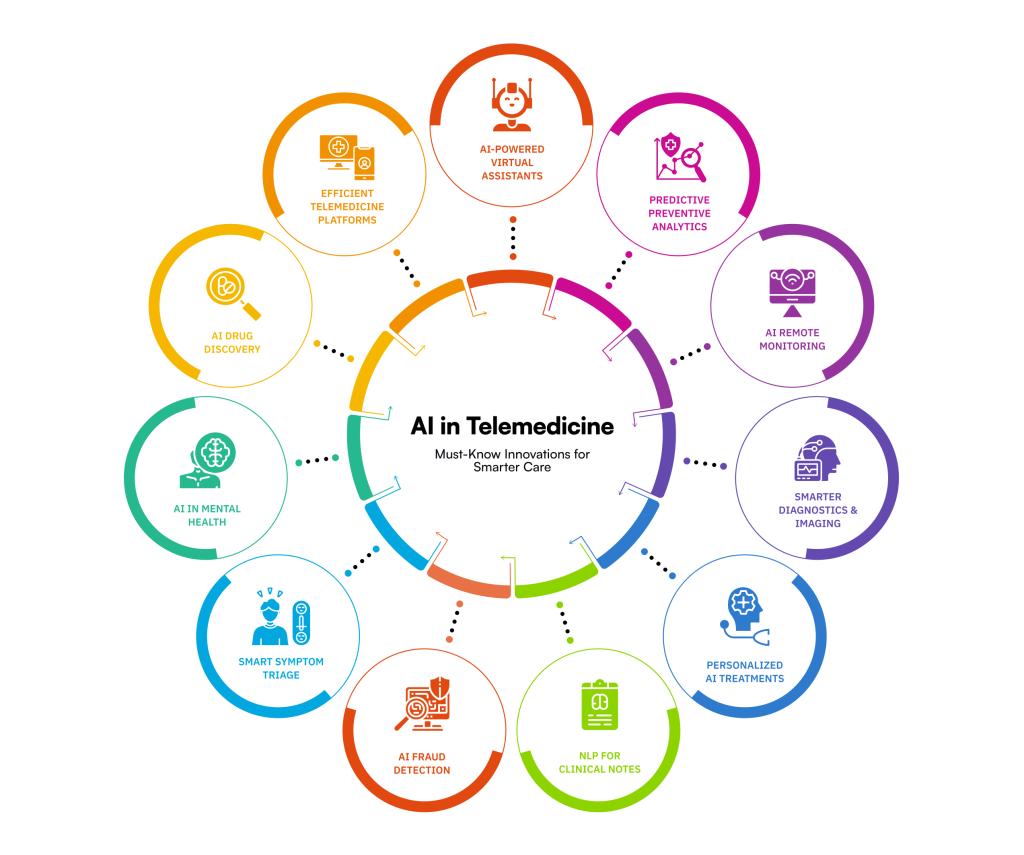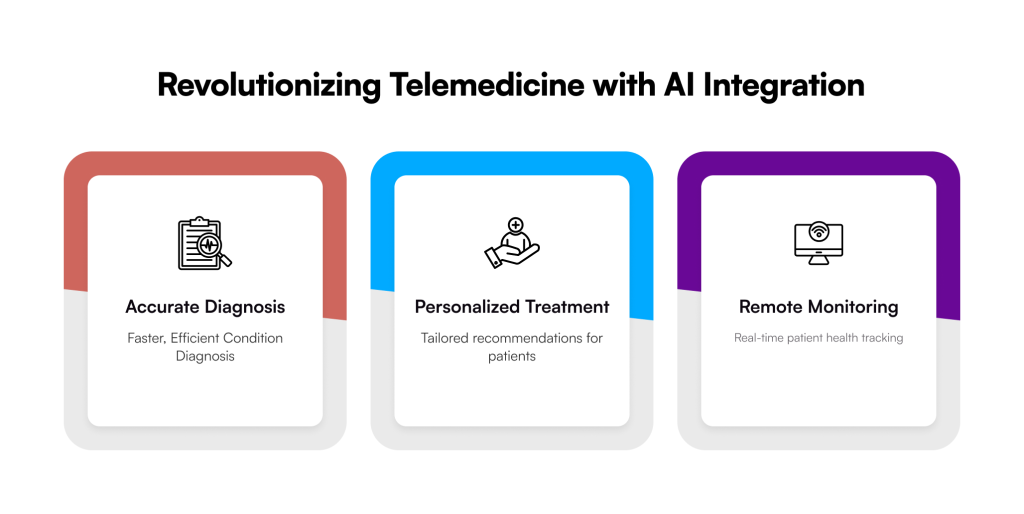Imagine you woke up with a sudden & unusual headache, and to cure this pain, you simply logged into an app, described your symptoms, and then? Next, you see yourself interacting with an AI-powered expert, who suggests the next steps.
Well, all of this sounds futuristic, right?
But what if we tell you this is actually a reality, far away from the future? Yes, it’s true, and this is the present reality of telemedicine. In recent years, the telemedicine landscape has accelerated and is growing at an unprecedented rate.
According to Fortune Business Insights, the global telemedicine market size is expected to reach $334.80 billion by 2032. Behind all this expansion, AI development is one of the biggest driving forces. With the help of artificial intelligence, you can not only enable faster diagnosis but also provide personalized treatment plans and much more.
The role of AI in telemedicine isn’t just making everything convenient, but smarter. In this blog, we’ll walk you through the 10 powerful and effective ways AI in the telemedicine market is redefining the future of the healthcare ecosystem.
AI in the Telemedicine Industry: Top Breakthroughs You Need to Know

Incorporating AI into telemedicine is a step closer to revolutionizing the healthcare industry as a whole, making it more accessible, improving individualized care, and much more. The future of AI in telemedicine is bright, ultimately closing the gaps between patients and healthcare professionals.
Let’s have a look at the different ways telemedicine and AI in healthcare are going hand-in-hand and making access to care much easier than ever.
- AI-Powered Virtual Assistants and Chatbots
What if you need urgent medical advice from a doctor at midnight, and you instantly get it from AI-powered chatbots or virtual assistants? With time, AI-driven tools are becoming sophisticated than ever, where virtual assistants can provide you with immediate support. From booking appointments & answering basic queries to giving medicine reminders to patients, AI chatbots have become the first touchpoint in telemedicine.
- Predictive Analytics for Preventive Care
What do you think is much better: reacting after any health issue strikes or predicting it and taking action beforehand? Obviously, the second option sounds much more useful. That being said, AI can help you with the same by understanding patients’ medical history and forecasting risks, like diabetes or hypertension. This way, you can reduce the possibilities of high-risk situations and get a doctor’s attention at an early stage.
- Remote Patient Monitoring with AI
Smartwatches have always been in trend for many reasons, but tracking real-time activity or the count of your steps remains at the top. With AI-enabled RPM, you can trigger a warning and go see your doctor before anything major happens. Wearables and IoT devices in real-time help in analyzing the data, and later, AI detects the unusual activities and alerts the person instantly.
- AI-Assisted Diagnostics & Imaging
IMAGINE: You sent an X-ray to an online platform assisted with AI capabilities and received a diagnosis at lightning speed. Sounds unrealistic, right? But with the presence of artificial intelligence, anything & everything is possible because its models are trained on medical images. Later, these future-ready technologies flag potential concerns with high accuracy by supporting tele-radiologists or dermatologists.
- Personalized Treatment Plans
AI-powered telemedicine equipment should, in general, offer individualized treatment plans for precise treatment planning. Patients may effortlessly traverse every stage, whether they are examining their therapy or consulting a doctor, thanks to a well-crafted UI/UX design. AI-powered customisation can be expanded to examine daily routines and historical medical data, providing individualized treatment regimens.
- NLP for Clinical Notes
Doctors say, “The best part is the time spent with patients, not the paperwork.” AI-driven NLP tools are now able to listen and take notes automatically and produce structured notes/documents and summaries (for example, prescriptions) during teleconsultations. It provides as close to a real assistant as possible and allows clinicians to focus on patients rather than typing.
- Fraud Detection in Telehealth
In the healthcare industry, security is the key to maintaining the user’s trust while they share their personal information. AI-powered systems are well-trained to identify any unusual activity, like strange billing patterns, information theft, or more. AI in the telehealth and telemedicine market gives innovative solutions that help improve patient safety. In short, the integration of AI in the telemedicine market has significantly improved fraud detection and delivered a seamless user experience.
- Symptom Checkers and Smart Triage Systems
Picture that as a digital nurse who is available 24/7. AI triage systems could ask questions in a structured manner to patients, evaluate the signs and symptoms associated with an illness, and determine whether the patient can self-manage, see their family doctor, or go to the emergency department. Thus, the opportunity to avoid unnecessary visits to emergency rooms, with less chance that a legitimate emergency would be missed.
- AI in Mental Health Teletherapy
How great you’d feel if you could talk to someone who could sense your mood instantly? AI is like that; It feels like having a personal therapist anywhere and at any time you want. By simply analyzing your tone, choice of words, or even the type of emojis you have used. After receiving such insights, therapists can easily identify the early signs of stress, anxiety, or depression, and provide the support you need.
- Drug Discovery and Tele-Pharmacy Integration
Drug discovery may not come to your mind when you think of “telemedicine,” but artificial intelligence is making the connections. AI is used by telepharmacy platforms to check for interactions and guarantee the safety of prescriptions, while machine learning models aid in the quicker identification of new medication compounds. Without having to enter a pharmacy, patients can obtain medication more quickly and safely.
- Operational Efficiency in Telemedicine Platforms
AI is the silent optimizer that works in the background. It improves the efficiency of telemedicine systems by predicting no-shows, reminding patients, and intelligently allocating doctors according to the complexity of the case. The outcome? Reduced patient wait times and improved physician time management.
What is the Future of AI in Telemedicine

The integration of AI in telemedicine can (or will) never replace professional doctors or physicians; it will just double their power, while assisting patients in a timely manner.
If we look in another direction, the future of AI in the telemedicine market will incline more towards a hybrid approach. That means, doctors will concentrate on empathy, complex cases, and decision-making, whereas AI will do the heavy-lifting, like data analysis, symptom triage, etc.
In a nutshell, the future of AI in telemedicine is a combination of cutting-edge technology, wider access, and better security protocols. AI being at the forefront will continue to make the healthcare industry modern and convenient.
Build Your First-Ever Smarter Telehealth Platform with Galaxy Weblinks
The future of digital healthcare looks promising than ever – all thanks to the integration of AI in telemedicine. From diagnostics to helping with real-time monitoring, AI has transformed the landscape of the healthcare sector, making it more accessible, efficient, and personalized.
However, if you truly want to leverage the potential of AI in the telehealth and telemedicine market, you need custom healthcare software development services to build a tailored solution. A skilful and experienced team that can understand your vision and turn it into reality.
At Galaxy Weblinks, we have a pool of the right technology partners who can bring their expertise to the table and meet your expectations. They will help you build a scalable and secure telehealth platform. We’ll craft highly intuitive interfaces while ensuring necessary compliance to make your app safe & secure.
Partner with us and build your dream telemedicine platform now!
FAQs
1. In what ways is AI enhancing telemedicine for patients?
AI makes telemedicine more accessible by providing instant triage, precise diagnosis, and customized care. Patients enjoy faster consultations, proactive health monitoring, and intelligent suggestions—all without ever having to leave their homes.
2. Can AI substitute doctors in telemedicine?
No, AI is not replacing doctors—it complements their abilities. AI performs routine tasks such as documentation, symptom interpretation, and monitoring, while doctors concentrate on high-order decision-making, empathy, and patient care, leading to improved outcomes for both providers and patients.
3. Is telemedicine AI safe and reliable?
Yes, when responsibly developed. Agencies such as the FDA and EU make certain that AI technologies adhere to rigorous safety, compliance, and accuracy protocols. Under proper regulation, AI in telemedicine is extremely reliable and on an upward trajectory of improvement.
4. What are some real-world examples of AI in telemedicine?
From AI-scheduling appointment chatbots to AI readers of X-rays and heart arrhythmias detected by wearables, numerous telemedicine platforms already apply AI on a daily basis. It accelerates healthcare, makes it more accessible, and more patient-focused.
5. What is the future of AI in telemedicine?
The future holds smarter telehealth applications that forecast health threats, link patients worldwide with experts, and provide hyper-personalized treatment. Thanks to continuous innovation, AI has the potential to turn telemedicine into the norm through which people receive healthcare globally.

